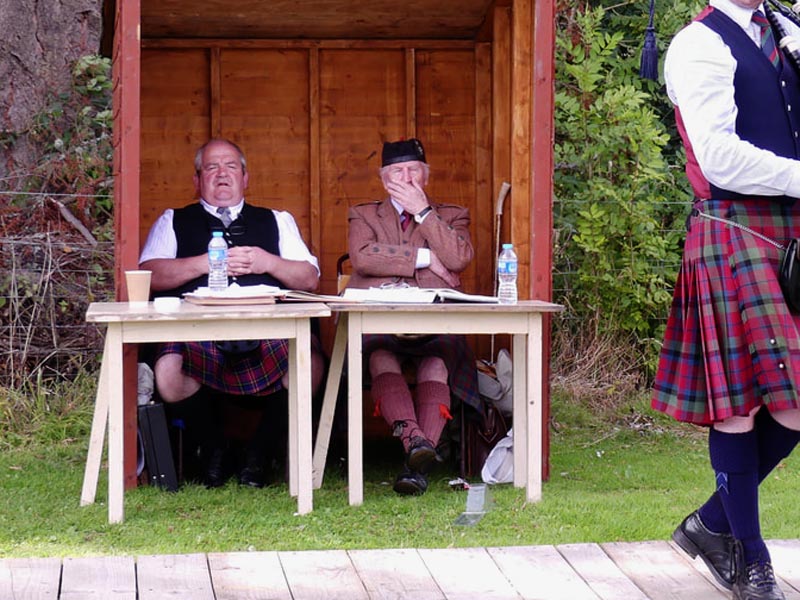Opinion: For the sake of the art and an audience, we need judging reform
Lord it’s the same old tune, fiddle and guitar
Where do we take it from here?
Rhinestone suits and new shiny cars
It’s been the same way for years
We need to change.
Somebody told me when I came to Nashville
Son you finally got it made
Old Hank made it here, we’re all sure that you will
But I don’t think Hank done it this way, no
I don’t think Hank done it this way.
 Music fans might recognize the lyric from the 1974 Waylon Jennings hit in which he lamented the stubbornness of country music culture to change. The “Hank” he refers to is country music demigod Hank Williams Sr. Like many lyrics, the words are ambiguous, but our interpretation is Jennings pleading for change in the wake of a traditional industry guarded by preservationists.
Music fans might recognize the lyric from the 1974 Waylon Jennings hit in which he lamented the stubbornness of country music culture to change. The “Hank” he refers to is country music demigod Hank Williams Sr. Like many lyrics, the words are ambiguous, but our interpretation is Jennings pleading for change in the wake of a traditional industry guarded by preservationists.
It’s a great song, and, like the best of great songs, it gets you thinking. It got us thinking about our music.
Goodness knows many of us bemoan the slowness of musical change in piping and drumming. We’re as steeped in musical tradition as any genre, but unlike almost every other musical genre, we have an extraordinary situation in which competition is our primary performance platform. So the music that succeeds in competition inevitably is the music we play. The influence trickles from those seriously vying for a Grade 1 World Championship on through the grades.
Our competition events have remained ostensibly the same for nearly 60 years since the extended competition medley was introduced. We say “extended” because the MSR is nothing more than a little medley. The formats and styles are long past their sell-by date. They simply don’t resonate with a growing audience.
But as much as the players and ever-dwindling listeners might desire musical change, we are locked out by gatekeepers.
Who, you might ask, are the gatekeepers, the arbiters of what is and isn’t acceptable?
The gatekeepers are the judges.
The judges of our competitions in our extraordinary art form have almost exclusive power to stop anything substantially new and creative in its tracks with a single stroke of the pen. Because we, almost without exception, put competition success before creativity, that which is deemed unsuccessful and inconducive or detrimental to winning is quickly abandoned.
The exceptions are the rare bands and soloists willing to fall on their swords as they boldly try to make an artistic statement. The last time this happened in pipe bands was a few decades ago when the Grade 1 Toronto Police played an esoteric “medley” that was a series of musical themes strung together. UK judges put paid to the notion of straying from the familiar lane by summarily pushing it to last, even mocking the band on the scoresheet. RSPBA judge Andrew Wright allegedly labelled it “mumbo-jumbo.”
Maybe he didn’t like the tunes, and, truth be told, we haven’t heard any of it played anywhere since, but the judges were firing an unmistakable warning shot to bands that they’d better not try anything like that again.
Ever since, bands have continued to tip-toe around the music. Solo piping is the same as it ever was, apart from accepting new tunes that fit the acceptable mould. The definition of sticking the neck out these days might be a band putting a bit of piobaireachd in a medley (first tried in the 1970s), and even for that, they risk paying a substantial competitive price from judges eager to jump on anything unfamiliar or different.
We can continue playing inaccessible and homogenous music with our figurative and literal backs to an ever-shrinking audience, or we can reach new fans by allowing creativity to prosper – by allowing the performing musicians to determine where our music can and should go.
It’s an evil circle: the bands don’t want to lose because they know the judges are risk-averse, so the bands play conservative music to please the judges, and the judges practice their own self-preservation, afraid of being ostracized from their precious judging gigs, so they actively put down creativity, which in turn is deemed competitively unsuccessful, and on and on.
This vicious circle is detrimental to an art that otherwise would and should thrive with creativity. Judges must be the first to change if we have any intention of our competitive art surviving by attracting new audiences and keeping young players interested.
We can continue playing inaccessible and homogenous music with our figurative and literal backs to an ever-shrinking audience, or we can reach new fans by allowing creativity to prosper – by allowing the performing musicians to determine where our music can and should go.
It’s a matter of training. Associations must coach judges to open their minds and welcome the different and imaginative. Sure, keep judging more rigid things like tuning, unison and ensemble, but allow the art to prosper and never dissuade today’s players from taking things in new directions. That means ensuring that those who are doing the coaching are open to and welcoming of creativity themselves. As it is (and there are a few exceptions), the trainers either obviously or implicitly teach the trainees to guard against change.
Weed out the fuddy-duddies, or put them in MSR purgatory until they, too, can’t face listening to yet another “Maggie Cameron.” Better yet, eliminate both the foosty judges and the decrepit MSRs.
There will be many who disagree, who genuinely love endlessly repeating the past. They can certainly carry on, but they will eventually play to an audience of none.
Interestingly, when Waylon Jennings wrote his rock ‘n’ roll-sounding “country” song criticizing those who preserve the past, he was already one of the biggest stars in music. He’d made it, and, with his “outlaw” reputation, he could blaspheme away. Had he been a younger upstart, his career almost certainly would have been ended by country music’s controlling judges of what can and can’t be said and played.
In reality, to push change forward, we also need Grade 1 bands seriously contending for a World Championship to make strong creative statements, essentially forcing judges to give credibility and viability to their music. Lesser-quality bands, as we have seen, get tossed aside. Woe betide the band that has yet to gain the right to be different. The change-makers are the competitive leaders.
Only then can the piping and drumming work towards new audiences by presenting new music. Time is getting short.
We need to fundamentally reform the process of judging before there’s nowhere left to play.
What do you think? We always welcome your thoughts, so feel free to use our Comments feature below.
We also welcome opinion pieces from our readers around the world. Please get in touch if you have an idea for a topic that you feel strongly about and are ready to open up to constructive dialog and debate.





Completely agree. I’ve been to countless pipe band competitions over decades, and I firmly recall two…
One was very long ago with the 78th Frasers playing a slur note…magic.
Another was when Shotts ended their medley by turning to face the audience.
Double magic.
We need more of that…
The article is complete nonsense. You think that bands playing MSR’s are keeping people at home. You think that by shifting the deckchairs you can suddenly bring an audience flooding back to pipe band contests, it’s not going to happen. Piping is a niche activity enjoyed by a small band of enthusiasts and is something I have spent a lifetime enjoying, but it is what it is, and no amount of tinkering around the edges is going to change that. To all intents and purposes Covid has put an end to contests as we knew them, sure organisers are finding it impossible to get sponsors so contests could well close down. Just been reading about the British this year. The RSPBA cant say they weren’t warned, they just put their fingers in their ears. Proper accountable leadership has been missing for decades, but the same people kept getting voted back into posts. so there is nothing you can do about it, put the pipes and uniform into the attic like I have done, and move on.
I’m coming to reply to this op-ed a couple of months after it appeared as I forgot to at the time. My own opinion on this spans both potential views on the opinion of change, or lack thereof, expressed here.
I disagree that MSRs are ‘problematic’, boring or the cause of people not wanting to watch bands. In this very magazine in 2004 I wrote an article on the topic. I love listening to them, and adjudicating them (drumming and ensemble). There is something compelling for me about a superbly played, interpreted and expressed MSR, playing or listening. That said, is there scope for bands to revive some of the lesser played MSRs for interest (without perceived penalty)? Absolutely. Should harmonies and other slight adjustment be precluded? Perhaps not.
I see MSRs – agreed as mini medley in and of itself – as akin to the figures in competitive ice skating. I would venture that even fewer people watch the figures in skating as opposed to the ‘free programs’ than do MSRs. But they do serve to prove a performer’s chops and discipline as a common denominator; and not of the lowest variety. They have standing and history culturally, beyond pipe bands, in some respects.
When it comes to medleys, I definitely agree that full license without penalty should be given to bands. Indeed, it should be encouraged in my opinion. Make things fun, make things a more interesting. What is, during a medley – as we occasionally hear in concerts – bands cut their chanters while the drummers do something interesting, before coming back in. After all, drummers do just that in reverse all the time in slow airs. It would give an adjudicator more to critique – exits and entries used judiciously and creatively – and certainly engage an audience and add more potential variety. Slurs, trills, not starting with two threes (as happened at the NZ nationals this year) or non-standard melody notes are all possible in addition, within the basic parameters of a pipe band performance.
I’d not go so far as to advocate for cymbals, cow bells and tuned toms in the circle, but bands have certainly not only weathered, but embraced tuned and orchestrated mid-sections in the last three decades to the point it’s now standard.
There may be the issue that all/some/most, current/past adjudicators in the RSPBA would never let such things pass. There have been bands at the top level, as mentioned, who have dared to push the envelope for better or worse for them depending on one’s view. Good on them, for mine. I may not be an RSPBA adjudicator (nor all that young and fresh anymore!), but I adjudicate with them – I was the only non-RSPBA-experienced adjudicator on a state championship panel yesterday, in fact.
If I heard something in a competition circle that was non-standard, my ears would prick-up, of course. I would contemplate it and likely think ‘no explicit rules have been broken here’ and move on to comment. If it enhanced the performance and worked musically and creatively, happy days in my book! If pressed, a judge would have to justify a negative critique beyond ‘that’s just not how it’s done’, I think.
Change, or at least slow evolution, has to start somewhere. I would not be one to stand in the way of it and be openminded if I was the one wielding the pen. I am not judging in the arena that’s the focus of this article, and while we all follow the RSPBA as a guide in large measure, there are occasional freedoms granted on other places what may one day catch on. At least I hope so.